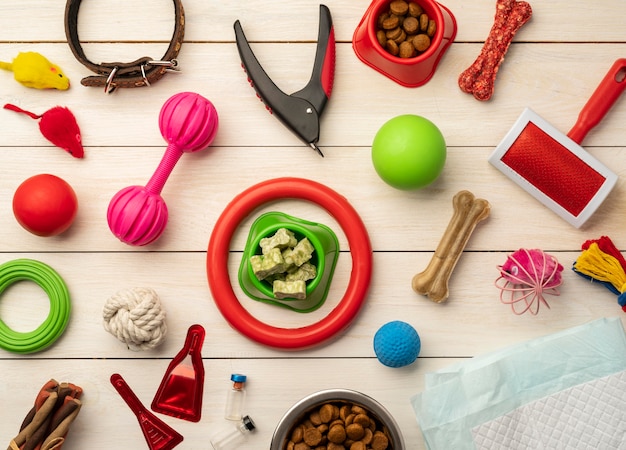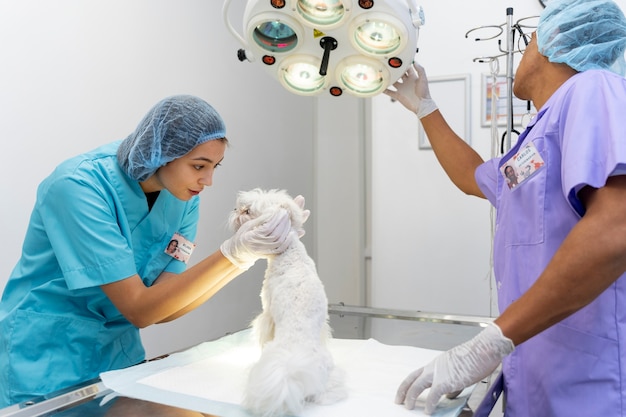Pet Hurricane Preparedness Tips for Memorial Drive Families


Pet Hurricane Preparedness Tips for Memorial Drive Families
As hurricane season approaches its peak in Houston, many pet owners find themselves wondering how to keep their cats and dogs safe during severe weather. At PetRight, our veterinary team understands that pets are cherished family members, and their safety is just as important as anyone else’s in your home. With the ever-present threat of storms in Houston and surrounding communities, taking steps toward pet hurricane preparedness is essential for families living near Memorial Drive. This blog will guide you through creating a pet emergency kit, developing a safety plan tailored for your pet, and managing stress for your furry companion during unpredictable weather events.
Our goal is to help you feel confident and prepared, knowing you have a plan in place for your pet’s wellbeing. As part of our commitment to comprehensive veterinary services in Houston, our team is ready to support you with preventive care and advice year-round. If you ever have concerns about your pet’s health or need guidance about preparing for storm season, we encourage you to schedule an appointment with our veterinarians at 14015 Memorial Drive, Houston, TX 77079. For families seeking reliable pet care in an emergency or routine setting, PetRight is here as your trusted "vet near me" in Houston.
Let’s explore the steps you can take to safeguard your pet during hurricane season and discover why being proactive can make all the difference for your beloved companion.
Recognizing When Pet Hurricane Preparedness Matters
Many pet owners wonder if they really need to go the extra mile for hurricane preparation, especially if their pets are indoor-only or seem calm during storms. However, the reality is that hurricanes bring unpredictable challenges including power outages, flooding, evacuation orders, and even disruptions to local veterinary services. Recognizing when pet hurricane preparedness is necessary starts with understanding your family’s potential risk factors.
Key scenarios that call for extra preparation include living in low-lying areas prone to flooding, having pets with medical needs such as ongoing prescription medications, or owning pets who are easily frightened by loud noises and changes in routine. Signs that your pet may be at higher risk during a hurricane include anxiety during thunderstorms, difficulty adapting to new environments, or a dependency on daily medication and prescription diets. Cats and dogs that have previously reacted poorly to travel or changes in their environment may also need additional support and planning.
If your pet has a chronic health condition or special dietary requirements, it’s especially important to prioritize preparedness. For pets who need regular checkups or vaccinations, staying current on preventive care can help avoid complications if veterinary services are disrupted by a storm. Families in Houston who have experienced previous hurricanes know that having a plan in place for their pets provides important peace of mind.
Why Hurricanes Pose Unique Risks for Houston Pets
Houston’s location along the Gulf Coast means that families must be vigilant during hurricane season, as tropical storms can develop quickly and bring a host of dangers. For pets, hurricanes can create stressful, unfamiliar situations that affect both their physical and emotional health.
Flooding can make it difficult to access veterinary clinics or even basic supplies, while power outages may disrupt climate control in homes, putting pets at risk of overheating or exposure. Evacuation orders may require pets to be transported suddenly, which can be distressing for animals who are not used to travel. Additionally, shelters and hotels may have specific requirements for pets, such as proof of up-to-date vaccinations, which is another reason to ensure your pet’s preventive care is current with your local Houston veterinarian.
Some of the most common risks to pets during hurricanes include exposure to contaminated water, injury from debris, getting lost during evacuations, and sudden changes in diet or medication routine. When pets experience anxiety and stress, they may be more likely to hide, refuse food, or even attempt to escape their carrier or leash. Being proactive with your pet hurricane preparedness plan will help you anticipate and address these risks before a storm hits.
If you need to update your pet’s vaccinations or want to make sure your pet is protected from seasonal threats like heartworm, our team can assist you with pet vaccination services and heartworm testing and treatment tailored for Houston’s unique environment. Staying current on preventive care is a crucial part of keeping your pet safe during hurricane season.
Creating a Pet Hurricane Preparedness Plan: What to Include
Developing a hurricane preparedness plan for your pet involves several key steps that can make all the difference during an emergency. The foundation of your plan should be a well-stocked pet emergency kit, complete with enough food, water, and medications to last at least one week. Essential items include your pet’s identification tags, recent photos, vaccination records, and microchip information to facilitate reunion if you become separated.
For pets with medical needs, be sure to include a supply of any prescription medications or special diets. Our veterinary pharmacy team at PetRight can help you obtain refills ahead of hurricane season to ensure you are never caught off guard. If you need assistance, our prescription food and pharmacy services are available to help keep your pet healthy and protected.
Your plan should also include a safe, transportable carrier or crate for each pet, as well as a leash, harness, or muzzle if needed. Make sure your pet’s carrier is large enough to allow them to turn around comfortably and contains familiar bedding or toys to reduce anxiety. For families with multiple pets, it’s important to have a plan for each animal, as some shelters and hotels may have restrictions.
In addition to supplies, your hurricane preparedness plan should outline evacuation routes, pet-friendly accommodations, and a list of emergency contacts, including your veterinarian’s information. Keeping your veterinarian’s number handy is essential in case you have questions about your pet’s health during a storm. If you’re looking for a "quality vet near me" to answer your questions or provide preventive care, PetRight offers comprehensive veterinary services in Houston and surrounding communities.
Reducing Stress and Providing Comfort for Your Pet During Hurricanes
Storms can be frightening for pets, leading to increased anxiety, changes in behavior, and even physical symptoms such as shaking, panting, or hiding. By taking steps to reduce your pet’s stress before, during, and after a hurricane, you can help protect their wellbeing.
Start by creating a familiar, quiet space in your home where your pet feels safe. This could be a designated room with their bed, toys, and a supply of food and water. Playing calming music or using pheromone diffusers designed for cats or dogs can help reduce anxiety. If you know your pet is particularly sensitive to storms, speak to your veterinarian ahead of time about possible options for managing anxiety, whether that involves safe medications or behavioral techniques.
During a hurricane, try to keep your pet’s routine as consistent as possible. Feed your pet at regular intervals, offer extra comfort and physical contact if they seek it, and monitor for signs of distress. If you must evacuate, stay calm and reassuring, as pets often take cues from your behavior. Be patient if your pet seems reluctant to enter their carrier or act fearful in new environments; gentle encouragement and familiar items from home can help ease the transition.
After the storm has passed, inspect your home and yard for any hazards such as downed power lines, standing water, or debris before allowing your pet outside. Some pets may continue to exhibit stress-related behaviors even after the immediate threat has passed, so ongoing support and attention are important. If you notice changes in your pet’s appetite, demeanor, or health, contact your veterinarian promptly for guidance. Our team at PetRight is committed to supporting your pet’s emotional and physical health during hurricane season and beyond.
When to Seek Emergency Pet Care in Houston
Despite your best efforts, emergencies can still arise during hurricanes. Knowing when to seek professional veterinary care is vital. Warning signs that require immediate attention include difficulty breathing, persistent vomiting or diarrhea, signs of heatstroke such as excessive panting or weakness, wounds or injuries, or any sudden collapse. If your pet has ingested contaminated water or appears confused and disoriented, these are also indicators that emergency care is needed.
During and after a hurricane, local clinics may experience high call volumes or limited access due to weather conditions. It is wise to familiarize yourself with the nearest veterinary clinic’s contact information and hours of operation. At PetRight, we encourage you to call ahead if your pet is experiencing a medical emergency. Our veterinary professionals can guide you on the next steps and let you know if immediate intervention is required.
For ongoing wellness, consider scheduling a wellness care and prevention visit with our team before hurricane season is in full swing. By staying proactive, you can ensure your pet’s health is optimized and that you are prepared for any unexpected situation. If you ever need guidance about what constitutes a true emergency, our veterinarians are here to provide sound advice and compassionate care.
Tips for Preventing Pet Health Issues During Storm Season
Prevention is always preferable to emergency intervention. Steps you can take at home to keep your pet healthy during hurricane season include ensuring vaccinations are up to date, maintaining a consistent supply of prescription food and medications, and keeping your pet’s identification current. Microchipping your pet can dramatically increase the chances of a safe reunion if you are separated during an evacuation.
Hydration is crucial, so always provide clean, fresh water and never allow your pet to drink standing or flood water, as it may be contaminated. Keep your pet indoors and secure during storms, and provide plenty of reassurance. Regular wellness checkups with your Houston veterinarian are essential to catch any issues early and reinforce your pet’s resilience before storm season.
If your pet has a sensitive stomach or skin issues that could be exacerbated by stress or environmental changes, speak with your veterinarian about preventive options. Our veterinary dermatology services can help address allergies or skin conditions that may flare up during stressful weather events.
Conclusion: Your Pet’s Safety Is Our Priority
Preparing your pet for hurricane season in Houston is an act of love that can save lives and reduce stress for your entire family. By creating a comprehensive preparedness plan, keeping up with preventive care, and knowing when to seek emergency pet care in Houston, you are giving your pet the best chance at a safe and healthy outcome.
If you have questions about pet hurricane preparedness, or if you need assistance with wellness care, vaccinations, or prescription refills, our veterinary team at PetRight is here to help. We invite you to schedule an appointment at our conveniently located 14015 Memorial Drive, Houston, TX 77079 clinic. Trust our veterinarians to be your resource for "vet near me" searches and for comprehensive veterinary services in Houston. For more information about our wellness care and prevention programs, visit our page on wellness care and prevention.
To ensure your pet is ready for any emergency, call us at (281) 497-6222 and let us support your family’s peace of mind. PetRight is proud to serve Houston and surrounding communities as your dedicated partner in pet health and safety.
This blog is intended for informational purposes and does not replace professional veterinary advice. Always consult your veterinarian for specific recommendations related to your pet’s health and hurricane preparedness.


















